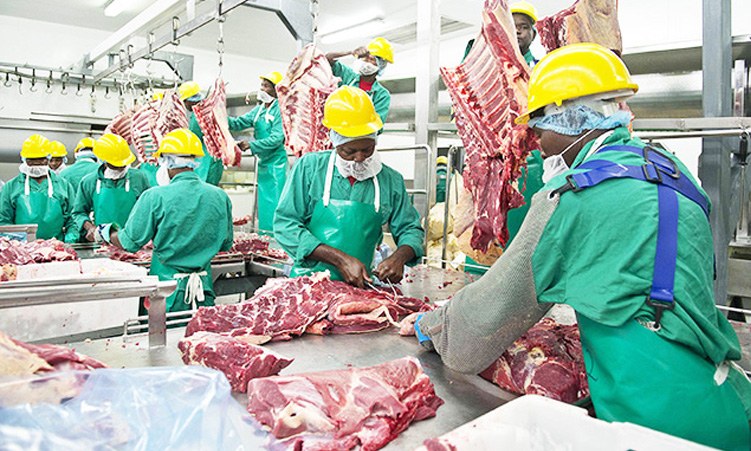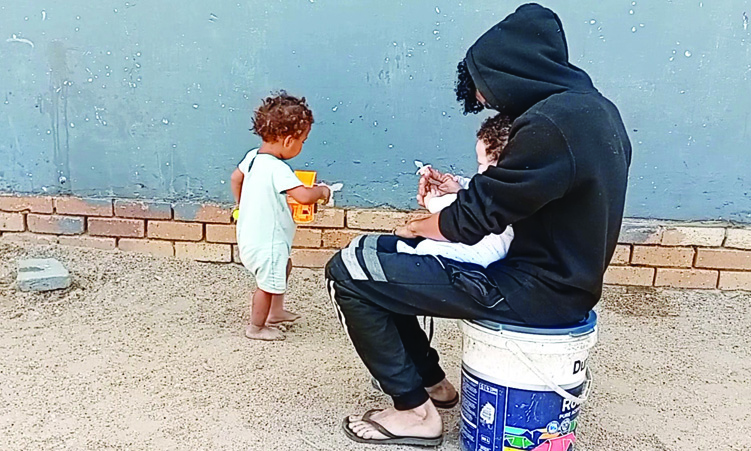THE World Food Programme (WFP) yesterday vehemently denied feeding contaminated beans to refugees at Osire.
Refugees have been up in arms since the weekend, after a consignment of 12 tonnes of beans was destroyed at the camp on Friday. The beans had been found to contain aflatoxins – poisonous substances produced by certain moulds that grow on food.These toxins can cause vomiting, abdominal pain, convulsions, coma, and even death.In extreme cases, they can affect the lungs (pulmonary oedema), brain (cerebral oedema), liver, kidneys and heart.Refugees are demanding that beans stored at the camp, some of which were distributed to them last month, be independently tested.On inquiry from The Namibian, WFP Programme Officer Ami Nagamune said the contaminated beans had been stored separately from those distributed to refugees as rations last month.These, she said, were definitely not contaminated.”We are very confident in our processes and because we think of their [the refugees’] health, we decided to destroy the food and conveyed this to the refugee committee, but unfortunately they took this in the wrong light,” Nagamune said.But Chairman for the Association for the Defence of Refugee Rights (ADR), MacGoddins Lushimba, maintains that many people at the camp, located near Otjiwarongo, have been suffering from diarrhoea in recent weeks.”We didn’t know what was going on when we saw all the black smoke.We were only told on Friday.We were told to stop eating the beans and have been urged to throw them away,” he said.Lushimba claimed that because the refugees were asked to destroy any beans received as rations recently, it fuelled suspicion that all the beans might be tainted.The United Nations High Commissioner for Refugees (UNHCR) in Namibia, Hesdy Rathling, was out of office yesterday and could not be reached for comment.A letter written by the WFP to the UNHCR on Thursday said 12 tonnes of beans would be destroyed after being tested by Veritas International Trade Division in Johannesburg on August 22 and found to be contaminated with aflatoxins.Veritas warned that the food was not fit for human or animal consumption.Nagamune said yesterday that the contaminated beans were never distributed to refugees, as the contamination was detected as soon as the shipment arrived in Namibia.The beans are believed to have sustained water damage during shipment.Nagamune said all the bags containing contaminated beans were marked with a big red cross and stored separately until they could be destroyed.The National Society for Human Rights (NSHR) said in a statement that the WFP could be criticised for not destroying the contaminated food immediately upon its arrival in Namibia.Nagamune said the WFP routinely tested all food aid before it entered Namibia.She said she did not believe that the refugees’ health complaints were linked to the food they were receiving.Nagumune said the beans still being stored and distributed at the camp arrived in July and were fit for human consumption.Refugees receive monthly food rations consisting of maize meal, oil, a soya blend and beans.The beans had been found to contain aflatoxins – poisonous substances produced by certain moulds that grow on food.These toxins can cause vomiting, abdominal pain, convulsions, coma, and even death.In extreme cases, they can affect the lungs (pulmonary oedema), brain (cerebral oedema), liver, kidneys and heart.Refugees are demanding that beans stored at the camp, some of which were distributed to them last month, be independently tested.On inquiry from The Namibian, WFP Programme Officer Ami Nagamune said the contaminated beans had been stored separately from those distributed to refugees as rations last month.These, she said, were definitely not contaminated.”We are very confident in our processes and because we think of their [the refugees’] health, we decided to destroy the food and conveyed this to the refugee committee, but unfortunately they took this in the wrong light,” Nagamune said.But Chairman for the Association for the Defence of Refugee Rights (ADR), MacGoddins Lushimba, maintains that many people at the camp, located near Otjiwarongo, have been suffering from diarrhoea in recent weeks.”We didn’t know what was going on when we saw all the black smoke.We were only told on Friday.We were told to stop eating the beans and have been urged to throw them away,” he said.Lushimba claimed that because the refugees were asked to destroy any beans received as rations recently, it fuelled suspicion that all the beans might be tainted.The United Nations High Commissioner for Refugees (UNHCR) in Namibia, Hesdy Rathling, was out of office yesterday and could not be reached for comment.A letter written by the WFP to the UNHCR on Thursday said 12 tonnes of beans would be destroyed after being tested by Veritas International Trade Division in Johannesburg on August 22 and found to be contaminated with aflatoxins.Veritas warned that the food was not fit for human or animal consumption.Nagamune said yesterday that the contaminated beans were never distributed to refugees, as the contamination was detected as soon as the shipment arrived in Namibia.The beans are believed to have sustained water damage during shipment.Nagamune said all the bags containing contaminated beans were marked with a big red cross and stored separately until they could be destroyed.The National Society for Human Rights (NSHR) said in a statement that the WFP could be criticised for not destroying the contaminated food immediately upon its arrival in Namibia.Nagamune said the WFP routinely tested all food aid before it entered Namibia.She said she did not believe that the refugees’ health complaints were linked to the food they were receiving.Nagumune said the beans still being stored and distributed at the camp arrived in July and were fit for human consumption.Refugees receive monthly food rations consisting of maize meal, oil, a soya blend and beans.
Stay informed with The Namibian – your source for credible journalism. Get in-depth reporting and opinions for
only N$85 a month. Invest in journalism, invest in democracy –
Subscribe Now!









